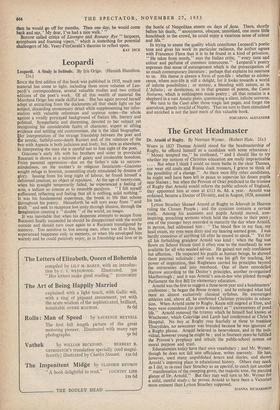The Great Headmaster
Dr. Arnold of Rugby. By Norman Wymer. (Robert Hale. 21s.) WHEN in 1827 Thomas Arnold stood for the headmastership of Rugby, he offered himself as a candidate with some reluctance : " Money tempted me," he confessed, " and I should like to try whether my notions of Christian education are really impracticable .... But when I think I could no more bathe in the clear Thames, nor wear old coats and Russia duck trousers, I grieve to think of the possibility of a change." As there were fifty other candidates, he might well have been left in peace to supervise his dozen pupils near Staines ; but when the Provost of Oriel predicted to the trustees of Rugby that Arnold would reform the public schools of England, they appointed him at once at £113 6s. 8d. a year. Arnold was ordained, became a Doctor of Divinity, and in August, 1828, assumed his task.
Lytton Strachey likened Arnold at Rugby to Jehovah in Heaven ruling the Chosen People ; and the cynicism contains a certain truth. Among his assistants and pupils Arnold moved, awe- inspiring, preaching sermons which held the restless to their pews ; one of the younger boys recorded in maturity the day when Arnold, in person, had addressed him : " The blood flew to my face, my head swam, my eyes were dizzy and my hearing seemed gone. I was hardly conscious of anything till after he ceased to speak." Yet for all his forbidding grandeur Arnold was kind : when the flag was flown on School House (and it often rose to the masthead) he was available for all who needed advice. He gained not only confidence but affection. He respected his pupils as human beings, he showed . them paternal solicitude ; and such was his gift for teaching, his power of inspiration, that Rugbeians carried his principles beyond the universities and into manhood. One of them remodelled Harrow according to the Doctor's principles, another re-organised Marlborough ; and it was Arnold's son-in-law who piloted through Parliament the first Bill for elementary education.
Arnold was the first to suggest a three-term year and a headmasters' conference ; he began the house system ; and he enlarged what had been an almost exclusively classical syllabus. He encouraged athletics and, above all, he confirmed Christian principles in educa- tion. When Arnold came to Rugby, Keate still reigned at Eton, and boys were considered (to quote a master) as " excrescences of pond life." Arnold removed the tyranny which he himself had known at Winchester, which Coleridge and Lamb had condemned at Christ's Hospital. No boy at Rugby rose fearfully at three to translate Thucydides, no newcomer was branded because he was ignorant of a Rugby phrase. Arnold believed in benevolence, and in the indi- vidual, however young he might be ; and in fourteen years he fulfilled the Provost's prophecy and rebuilt the public-school system on moral purpose and trust.
Educationists today have their own vocabulary ; and Mr. Wymer, though he does not fall into officialese, writes unevenly. He has, however, used many unpublished letters and diaries, and shown Arnold's imposing place in educational history. Others may need, as I did, to re-read their Strachey as an aperitif, to catch just another " manifestation of the sweeping gown, the majestic tone, the piercing glance of Dr. Arnold." But they may well turn to Mr. Wymer for a solid, careful study : he proves Arnold to have been a Victorian more eminent than Lytton Strachey supposed.
JOANNA RICHARDSON
































 Previous page
Previous page